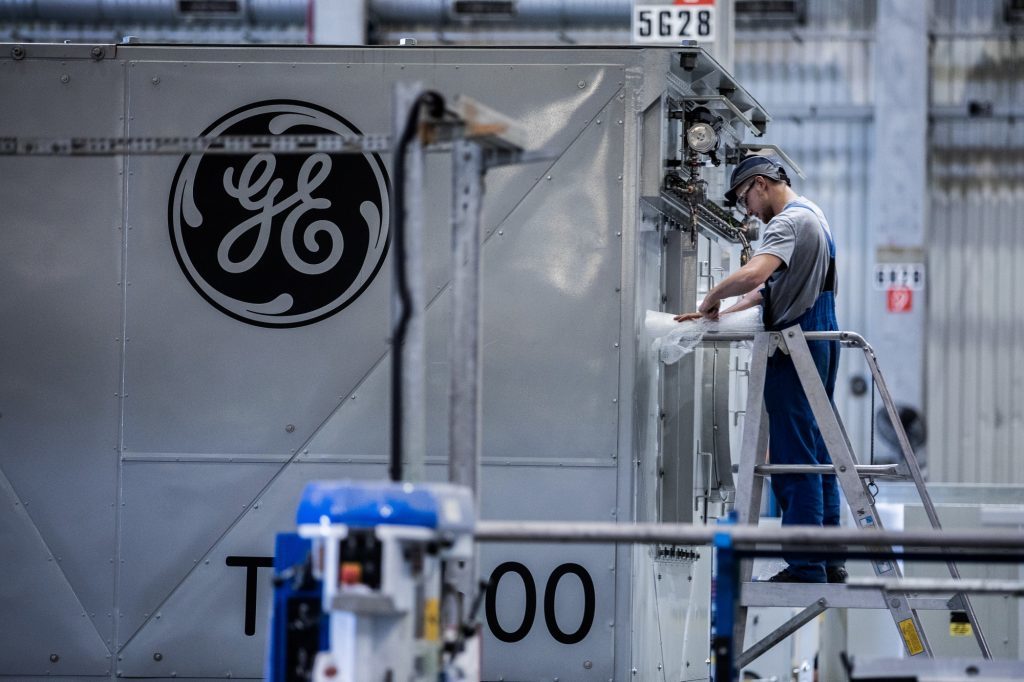
General Electric Co.’s new boss is dramatically reshaping the company and slashing the dividend as he looks to pull the manufacturing icon out of one of the deepest slumps in its 125-year history.
The moves failed to win over investors.
Chief Executive Officer John Flannery plans to narrow GE’s focus around power, aviation and health-care equipment while exiting businesses such as lighting and locomotives that have defined the company for decades. He’s also trimming the size of the board, revising the compensation program and chopping the quarterly dividend in half — only the second cut since the Great Depression.
The sweeping changes announced Monday underscore the severity of the challenges facing the new CEO, who is grappling with a stock that has lost $100 billion in market value this year. Plagued by poor cash flow amid slumping markets in power generation and oil-field equipment, GE is by far the biggest loser on the Dow Jones Industrial Average this year.
“Whether investors will consider these actions sufficient to form a bottom for the stock remains to be seen, but there is no doubt that the plan outlined today marks a new era for GE,” Deane Dray, an analyst at RBC Capital Markets. “That said, does it go far enough?”
The shares dropped 3.8 percent to $19.71 at 10:12 a.m. in New York after plunging as much as 7.3 percent, the biggest intraday decline in two years. GE fell 35 percent this year through Nov. 10.
Flannery already has made changes to top management, sought deep cost cuts and welcomed a representative of activist investor Trian Fund Management to GE’s board. Over the next two years, GE will explore options to exit its majority stake in Baker Hughes, a provider of oil-field equipment and services. GE’s lighting business traces its origins to the company’s formation by Thomas Edison.
“The GE of the future is going to be a more focused industrial company,” Flannery, who took over in August from Jeffrey Immelt, said in a presentation. “Soon we’re going to be proud of the performance.”
Flannery, who previously ran GE’s unit manufacturing medical scanners and other health equipment, said last month that the company would divest at least $20 billion of businesses.
Lowered Forecast
The moves follow a broad portfolio reshaping in recent years as Immelt sold most of GE’s finance and consumer operations. Still, the latest steps will keep most of the current company intact and stop short of the full-scale breakup some analysts have recently called for.
Earnings next year will be $1 to $1.07 a share, GE said. That represents a significant decline from the $2 target that management has been discussing for several years. The new outlook is closer to analysts’ expectations, which were $1.18 on average before Monday’s announcement, according to estimates compiled by Bloomberg.
The forecast became a point of contention this year as Immelt suggested in May that $2 a share would be tough to reach, a month after Trian, which has been one of GE’s largest shareholders since 2015, said it believed GE could exceed the target.
GE will shrink the size of its board to 12 from 18 directors amid criticism from some investors and analysts over the size. Of the remaining members, three will be new to the board, GE said.
Dividend Decision
The quarterly payout will drop 50 percent to 12 cents a share, the Boston-based company said in a statement Monday, in a move that will save about $4.2 billion a year. GE last reduced the dividend in 2009 as it struggled with fallout from the financial crisis.
“We understand the importance of this decision to our shareowners and we have not made it lightly,” Flannery said in the statement. “We are focused on driving total shareholder return and believe this is the right decision to align our dividend payout to cash flow generation.”
GE in October slashed its expectations for 2017 profit and cash flow as Flannery called the company’s performance “completely unacceptable.”
Investors have been bracing for a dividend cut as GE’s slide deepened in recent weeks. The payout had been recovering from a dramatic 68 percent cut in 2009, after Immelt for weeks had said the payout was safe. Immelt has called slashing the dividend “the worst day of my tenure as CEO.”